|
|
|
Sort Order |
|
|
|
Items / Page
|
|
|
|
|
|
|
| Srl | Item |
| 1 |
ID:
120728
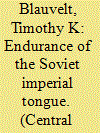

|
|
|
|
|
| Publication |
2013.
|
| Summary/Abstract |
This article will examine the role of the Russian language on the periphery of the post-Soviet space by using multiple sources of data, including original matched-guise experiments, to examine the language situation in contemporary Georgia. This is one of the former Soviet republics in which the use of the titular language was most intensively institutionalized and that most ardently resisted Russification, and one that today for various reasons is most eager to escape the legacy of its Soviet past and to embed itself in the global community. In Georgia the cultural and political influence of the former imperial centre has been greatly reduced, and Russian has been challenged in functional roles by the new international lingua franca of English. The direction that the Russian language takes in a place like Georgia may be a useful bellwether for such transformations elsewhere in the post-Soviet periphery.
|
|
|
|
|
|
|
|
|
|
|
|
|
|
|
|
| 2 |
ID:
195181


|
|
|
|
|
| Summary/Abstract |
In recent decades, as part of the efforts of the Chinese government first to integrate and, more recently, to forcibly assimilate the Uyghur population into China’s mainstream culture and society, the Uyghur language has been marginalized and repressed to an unprecedented extent. The academic literature on Xinjiang’s language policy has repeatedly acknowledged that this repression is a major source of concern and discontent among many Uyghurs. However, to date, little has been written about the public response of Uyghurs to this policy and their open efforts to challenge it. In particular, with very few exceptions, little is known about the public response of Uyghur writers and artists. In this article I analyse a large corpus of Uyghur poems and songs that engaged openly with the Uyghur language crisis and were published and disseminated in the Uyghur public sphere between the mid-1990s and the mid-2010s. Unlike some studies that try to assess the condition of certain languages at a certain point in time through objective methodologies, these literary and artistic works provide an insider view on how the Uyghur cultural elite and many other Uyghurs experienced the repression and loss of their native language, and also, how they struggled against this repression. In the article I examine the diverse sentiments, perceptions, and discourses that these literary and artistic expressions communicate, and the different strategies that the Uyghurs used to struggle against the language policy and its consequences. I also explore what these works tell us about the development of Xinjiang’s language policy over time, the linguistic reality in the region, and the impact that the language policy has had on Uyghur society. Finally, the article also investigates the broad political meanings of these works and speculates on the link between them and the efforts of the Chinese government to further marginalize the Uyghur language.
|
|
|
|
|
|
|
|
|
|
|
|
|
|
|
|
| 3 |
ID:
106444
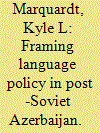

|
|
|
|
|
| Publication |
2011.
|
| Summary/Abstract |
This article describes how the successive Azerbaijani governments of Heydar Aliyev (1993-2003) and Ilham Aliyev (2003-present) have pursued a largely symbolic language policy, enabling them to portray themselves as protectors of both a unique Azerbaijani identity and interethnic harmony while actually expending minimal resources. Given the demographic dominance of Azerbaijanis in Azerbaijan, language revitalization is framed as being inevitable and natural, requiring little state intervention. Indeed, the Aliyev governments have framed such symbolic policies as being preferable to the more nationalistic approach favoured by the pan-Turkic government of the Azerbaijani Popular Front (1992-93), the remnants of which have become the main opposition to the Aliyev governments. However, the Azerbaijani opposition has since largely adopted policies similar to those of the government; the difference between the two groups lies in how they portray the government's efforts.
|
|
|
|
|
|
|
|
|
|
|
|
|
|
|
|
| 4 |
ID:
143672
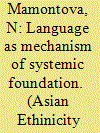

|
|
|
|
|
| Summary/Abstract |
This article explores S. M. Shirokogoroff’s critical approach to the study of language as a part of culture and a means of scientific classifications of mankind into a certain number of linguistic categories. The purpose of this article is to highlight a peculiar but rather underestimated contribution of Shirokogoroff to sociolinguistics, as his ideas were often stranded in critical relation to much that was dominant in social and linguistic thought in the first part of the twentieth century. Three dimensions of his work are mainly the focus of this article: the Ural-Altaic hypothesis, linguistic classifications, and the creation of standard languages in Soviet Russia. Finally, it discusses the applicability of Shirokogoroff’s critique to the contemporary Russian nationalities’ policy towards indigenous minorities.
|
|
|
|
|
|
|
|
|
|
|
|
|
|
|
|
| 5 |
ID:
148655
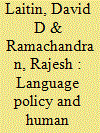

|
|
|
|
|
| Summary/Abstract |
This article explores how language policy affects the socioeconomic development of nation states through two channels: the individual’s exposure to and (in reference to an individual’s mother tongue) linguistic distance from the official language. In a cross-country framework the article first establishes a robust and sizeable negative relationship between an official language that is distant from the local indigenous languages and proxies for human capital and health. To establish this relationship as causal, we instrument language choice with a measure of geographic distance from the origins of writing. Next, using individual level data from India and a set of 11 African countries, we provide microempirical support on the two channels—distance from and exposure to the official language—and their implications for educational, health, occupational and wealth outcomes. Finally, we suggest policy implications based on our findings.
|
|
|
|
|
|
|
|
|
|
|
|
|
|
|
|
| 6 |
ID:
122828
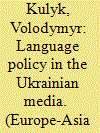

|
|
|
|
|
| Publication |
2013.
|
| Summary/Abstract |
This article deals with language policy in one crucial domain, the media. It treats language policy as the interaction between actions or inactions of the authorities, producers and consumers contributing to change or continuity of existing practices. It is argued that the main long-term contribution of all three actors, despite some notable changes, is the maintenance of the status quo characterised by the coexistence of Ukrainian and Russian with the predominance of the latter language. In particular, consumers mostly maintained their accustomed language preferences, although they did not resort to any protest actions when those preferences were disregarded.
|
|
|
|
|
|
|
|
|
|
|
|
|
|
|
|
| 7 |
ID:
177707
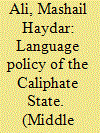

|
|
|
|
|
| Summary/Abstract |
This article examines and critiques the macro top-down constitutional language policy of the so-called the Caliphate State, often referred to by the acronyms ISIS and ISIL. Although Sharicah law, claimed to be the only source of the Caliphate’s laws, does not legislate local, official and national language policies, the Caliphate constitutionalises language policy through the misappropriation of Quranic verses. Article 8 of the constitution mandates the adoption of Arabic as the exclusive national and official language of the Caliphate project and its educational system. The monolithic policy exploits the symbiosis between Arabic and Islam to uproot the Islamic tradition of diversity and plurilingualism, advance its homogenising discourse, and globalise militancy. A religiously justified language policy is instrumental for the Caliphate in achieving cultural and linguistic cleansing, propagating its religious-political ideology and maintaining a strict assimilatory mould of indoctrination.
|
|
|
|
|
|
|
|
|
|
|
|
|
|
|
|
| 8 |
ID:
081255
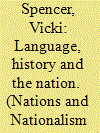

|
|
|
|
|
| Publication |
2008.
|
| Summary/Abstract |
In contrast to the abstract commitment to individual rights found in liberal critics of Bill 101 and the equally ahistorical approach of multicultural theorists like Bhikhu Parekh, this paper proposes that the particular historical circumstances surrounding the current minority status of different groups is crucial in evaluating the legitimacy of one cultural group to promote its cultural needs over another group within existing states. When the culture of a group residing within a particular state is secure in a neighbouring jurisdiction, the issue at stake is not necessarily the survival of a unique culture but the cultural needs of particular individuals. It does not follow that they have no legitimate claims against the state. However, in examining the language policies in Quebec and the newly independent Baltic states, it is argued that they are different in kind to the rights due to long-standing communities struggling for linguistic surviva
|
|
|
|
|
|
|
|
|
|
|
|
|
|
|
|
| 9 |
ID:
156600
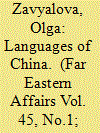

|
|
|
|
|
| Summary/Abstract |
In the epoch of modern information technologies, China remains an exceptionally diversified country linguistically. The implementation of the nationalities policy is inseparable from the study of the languages of the different peoples inhabiting the PRC. Major linguistic research is an important component of programs aimed at the preservation of the non-material cultural heritage of the country. After the proclamation of the One Belt, One Road strategy in 2013, the study of transborder languages , which exist on the territories of neighboring countries, has acquired special importance.
|
|
|
|
|
|
|
|
|
|
|
|
|
|
|
|
| 10 |
ID:
187224
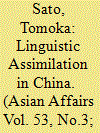

|
|
|
|
|
| Summary/Abstract |
Recent news about China's attitude the human rights of Uighurs in Xinjiang and its crackdown on civil liberties in Hong Kong has drawn a great deal of attention in the western media, with China facing a barrage of criticism from that source. Shortly before these developments came to light, China was taken to task over violence against Tibetans, which some viewed as cultural genocide. In contrast, the plight of Inner Mongolians is not widely known. In 2020, the Chinese government announced a new language policy promoting immediate Mandarin-language education in schools in the region. This shows how actively China has been eradicating the identity of peripheral minority groups. This article begins with a brief historical overview of China's linguistic assimilation policy toward ethnic minorities, followed by an investigation based on existing research and media information on the current position in Inner Mongolia and in particular of Mongolians living in Japan.
|
|
|
|
|
|
|
|
|
|
|
|
|
|
|
|
| 11 |
ID:
067487
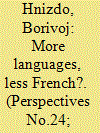

|
|
|
| 12 |
ID:
098114
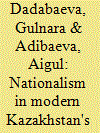

|
|
|
| 13 |
ID:
165922
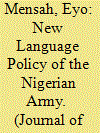

|
|
|
|
|
| Summary/Abstract |
I argue in this paper that the new language policy of the Nigerian Army recognizes and promotes the dominant languages as resources for military training, intelligence gathering and peace building, while the dominated languages are marginalized, alienated and relegated, thus the policy infringes on the fundamental linguistic rights of speakers of minoritized languages in the army. I further maintain that the Nigerian Army’s exclusive language policy is harmful to the army as a national institution and call for explicit status planning of the Nigerian Pidgin to serve as the language of wider communication in the army in response to its emerging sociolinguistic challenges.
|
|
|
|
|
|
|
|
|
|
|
|
|
|
|
|
| 14 |
ID:
192510
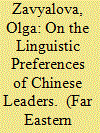

|
|
|
|
|
| Summary/Abstract |
Chinese leaders have been attuned to language issues for centuries. In his speech at the 20th CPC Congress, Xi Jin-ping mentioned the continued promotion of the Putonghua official language and the standard Chinese character writing system as the main task of the country's language policy. Promoting traditional culture and preserving ancient written texts is another important task in modern China. It is no coincidence that soon after the 20th Congress, Xi Jinping visited excavations and a museum park at Yinxu, the site of the capital of the second period of the Shang-Yin Dynasty, where the most ancient jiaguwen Chinese inscriptions have been discovered. In the current period of revival of philological traditions, Xi Jinping's signature in his own calligraphic version with the traditional, non-simplified character 習 xí is widely used in Chinese propaganda. The importance of popularizing Chinese language and culture outside the country was discussed in a letter that Xi Jinping sent to a group of students from Saudi Arabia soon after the 20th Congress. As for the Hanyu Pinyin romanization system for Standard Mandarin Chinese, introduced in the PRC in 1958 - it is either positioned in official documents as an auxiliary means to be used in Chinese primary schools for writing Chinese words in foreign language texts and teaching Chinese to foreigners, or it is not mentioned at all.
|
|
|
|
|
|
|
|
|
|
|
|
|
|
|
|
| 15 |
ID:
180691
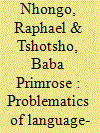

|
|
|
|
|
| Summary/Abstract |
Language policies that are designed in African countries fail to solve communication problems because they are only there to fight the hegemony of English instead of addressing real linguistic problems. The paper analyses the language-in-education policies that were put in place after independence in Zimbabwe. A qualitative approach is used to analyse documents that include the Education Act of 1987, the Nziramasanga Commission, Ministry of Primary and Secondary Education circulars and the Constitution of Zimbabwe. It is argued in this paper that there is a need for the country to come up with policies that are in sync with the linguistic realities that acknowledge the coexistence of languages.
|
|
|
|
|
|
|
|
|
|
|
|
|
|
|
|
| 16 |
ID:
159831
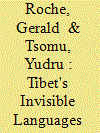

|
|
|
|
|
| Summary/Abstract |
China is facing a language endangerment crisis, with half of its languages decreasing in number of speakers. This article contributes to the understanding of language endangerment in China with a case study of the Gochang language, which is spoken by about 10,000 Tibetans in western Sichuan. We describe Gochang as an “invisible” language – one that is overlooked by the state's ethnic and linguistic policies and thus is more vulnerable to the social transformations wrought by statist development. Using UNESCO's language vitality and endangerment framework to assess the endangerment of Gochang, we conclude that the language is “definitely endangered.” Our comparison of Gochang with other “invisible” languages in China shows that most are in a similar predicament, suggesting that China's language endangerment crisis is likely to continue unless these languages receive formal recognition or local governments take advantage of ambiguities in the policy framework to support them. The social impacts of a continuing, deepening language endangerment crisis in China are as yet unknown.
|
|
|
|
|
|
|
|
|
|
|
|
|
|
|
|
| 17 |
ID:
118808
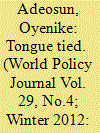

|
|
|
|
|
| Publication |
2012.
|
| Summary/Abstract |
Lagos-In her song "One Kilometer, One Language," Nigerian pop star Evi Edna Ogholi captures Africa's linguistic complexity. In pidgin English, she raps, "One kilometer means another language, half a kilometer means another language … na which one we go speak?" According to a 2010 UNESCO report, the number of indigenous languages in Africa ranges from 1,000 to 2,500. After the 19th century scramble for Africa, colonial governments also overlaid three other languages-the English that became dominant in West and East Africa, the French of West and Central Africa, and the Portuguese spoken mainly in southern Africa. Post-independence Africa is still tied to these languages. Though there have been calls for the promotion of indigenous languages, the reality on the ground may force African countries to rethink their language policy, and by implication, their entire economic, social, and cultural environment.
|
|
|
|
|
|
|
|
|
|
|
|
|
|
|
|
| 18 |
ID:
141265
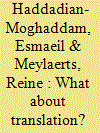

|
|
|
|
|
| Summary/Abstract |
Against the background of language policy research on Iran, and drawing on insights from recent scholarship on the role of translation in language policy, this article calls into question the claim that “Persianization” of non-Persian peoples is the main element of language policy in Iran. In so doing, the article examines closely the role of translation as enacted in two legal instruments: the Constitution of the Islamic Republic of Iran and the Law of Parliamentary Elections. The study illustrates that although official communication between Iranian authorities and citizens is a prototypical example of monolingualism and non-translation, voluntary translation happens between Persian and non-Persian speaking individuals, acting as a viable and cost-effective bottom-up alternative for the inclusion of non-Persian speaking peoples, far more effective than an impractical, top-down language policy reform implicitly found in the “Persianization” claim.
|
|
|
|
|
|
|
|
|
|
|
|
|
|
|
|
| 19 |
ID:
188605
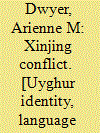

|
|
|
|
|
| Publication |
Washington, D C, East - West Center Washington, 2005.
|
| Description |
xii, 106p.pbk
|
| Series |
Policy Studies; 15
|
| Standard Number |
1932728287
|
|
|
|
|
|
|
|
|
|
|
|
Copies: C:1/I:0,R:0,Q:0
Circulation
| Accession# | Call# | Current Location | Status | Policy | Location |
| 060286 | 306.44/DWY 060286 | Main | On Shelf | General | |
|
|
|
|
|
|
|
|
|